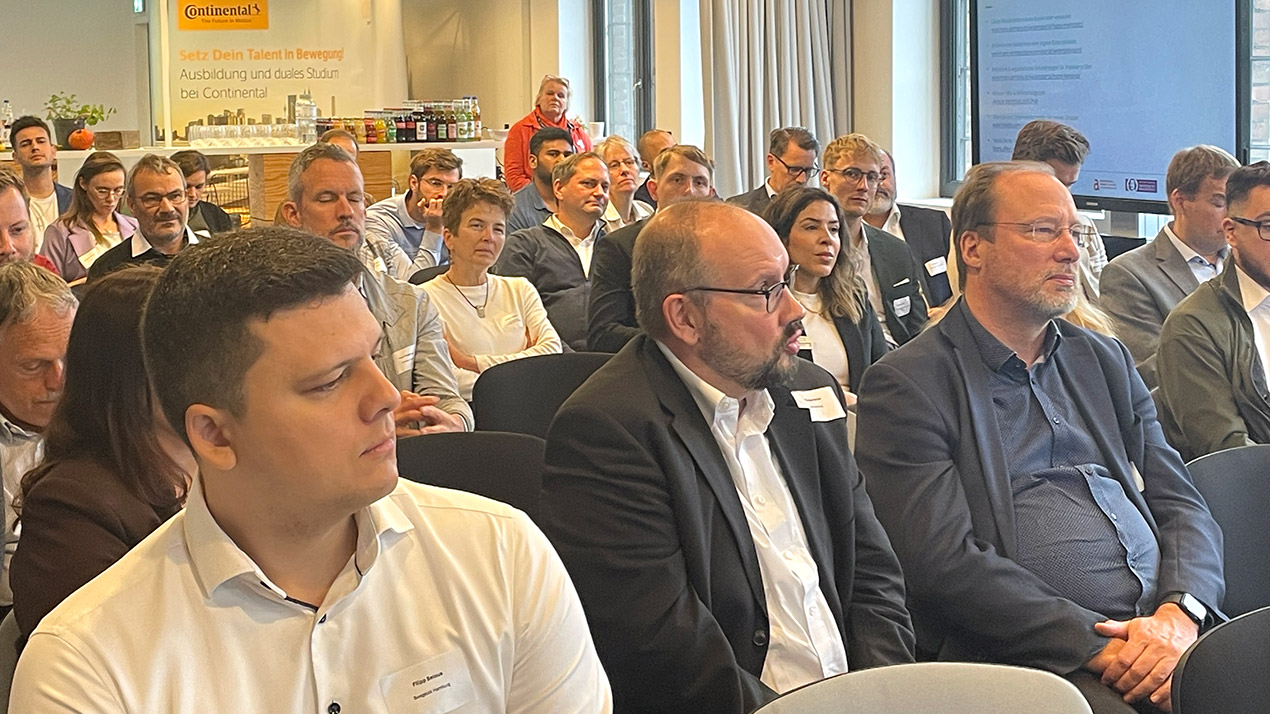The summit took place at the ContiTech Innovation Hub – an inspiring space where industry, research and start-ups come together. At HCAT+, we have been working intensively on competence development in the hydrogen sector since 2023. In this time, a strong network has emerged – the Hydrogen Competence Network, which is visibly strengthening and connecting the Hamburg region in this key future field.
From industry to innovation
The event was opened by Kai Gehrmann (ContiTech), who gave an impressive presentation showing how innovative solutions in hydrogen technology are already becoming reality today.
Using the development of a high-pressure hose for hydrogen refuelling as an example, he made it clear that true progress can only be achieved when technological innovation and education go hand in hand. His contribution bridged the gap between industrial practice and knowledge transfer – and set the perfect tone for a day full of energy, dialogue and inspiration.
Sabine Frykmer (HCAT+) and Kirsten Schümer (Renewable Energy Hamburg) guided participants through the programme with dynamism, ease and a good sense of humour. They connected topics with stories, questions with perspectives, and expert input with exchange – while also giving a brief review of our Hydrogen Competence Network activities, including the visit to the Hydrogen Campus Salzgitter and the Hydrogen Dialogue, which keeps the topic and the network alive throughout the year.
The key question:
How can knowledge be successfully transferred in the field of hydrogen – in Hamburg, across the region and beyond industry boundaries?
Impulses from research, start-ups, and practice
Dr Jutta Janßen (Hydrogen Campus Salzgitter) demonstrated how education and training can specifically contribute to securing skilled workers – for example through the innovative master’s programme Battery and Hydrogen Technology, which prepares students for key competencies in the energy sector.
She emphasised that while building expertise in this field is complex, it is essential for the long-term success of the energy transition.
Prof. Dr Kristin Hecht took the audience on a journey through the Central German H₂ Hub, explaining how learning alliances between universities, industry and research make knowledge tangible – and how this model could inspire Hamburg.
Leon Rosenberger (HTM Hydro Technology Motors GmbH), a young project manager, brought the start-up perspective to the stage. In his presentation Employee Training for Hydrogen in Start-ups, he showed that for small teams, every impulse matters – whether technical skills, safety, or interdisciplinary collaboration. His message: learning should be a living culture within the company, not just a process.
Julien Macele (Hamburg Green Hydrogen Hub) illustrated how Hamburg is flipping the switch towards a green industrial future with the planned 100 MW electrolysis plant in Moorburg – a strong signal of change. He highlighted the value of collaboration with universities, for example through master’s theses with the Helmholtz Centre Hereon and Helmut Schmidt University.
Dr Sebastian Altmann (ZAL TechCenter) provided insights into ZAL – a place where joint research projects, shared infrastructure and regular exchange promote knowledge transfer among stakeholders.
He underscored how crucial informal meeting spaces are: when people exchange ideas, discuss challenges and share insights, innovation accelerates.
Workshops, lunch and lively networking
After the presentations, it was time for coffee, brainstorming and connection! Workshop groups continued the discussion – in the Pitch Room, Faraday Space and DaVinci Space. Ideas were buzzing everywhere about how to share knowledge and make it visible and effective.
We will now take the insights gathered at the summit and explore which of them can be further developed and implemented together with our network – because this summit was not the end, but the beginning of new initiatives.
The day concluded with a joint lunch hosted by ContiTech – a welcome opportunity to continue the lively exchange in a relaxed atmosphere, make new contacts and deepen existing partnerships.
Special thanks go to Laura Wohnrath (HCAT+), who coordinated the entire summit with outstanding organisation, passion and an exceptional eye for detail – ensuring that everything ran seamlessly.
Conclusion: Education is the true source of energy
The Hydrogen Education Summit at the ContiTech Innovation Hub clearly showed that the energy transition depends not only on technology, but above all on people – people who share knowledge to create new knowledge, networks that grow through exchange, and places where ideas, expertise and practice come together.
Or, as we like to say at HCAT+:
Only those who promote education can shape the future.
